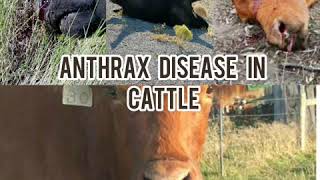South Dakota State University Extension and South Dakota Animal Industry Board veterinarians are encouraging South Dakota cattle producers to include the anthrax vaccine in their vaccination program when they turn out cattle to summer pastures this spring.
Anthrax is a disease of cattle and other ruminants that results in sudden death in affected animals. It is also a potential human pathogen. Anthrax is caused by bacteria that take an environmentally resistant, or spore, form in the soil. When the right conditions exist, these spores can be made available for cows to graze. Once eaten by cattle, the spores become activated and produce toxins within the body that cause rapid death.
"While the anthrax risk is well-documented in many parts of South Dakota, and anthrax vaccination of cattle is routine in those areas, it is not always possible to predict where cases may occur," says Russ Daly, professor, SDSU Extension veterinarian and state public health veterinarian. "South Dakota producers are encouraged to use anthrax vaccine in their herds going to summer pastures. Cattle going onto pastures that may become heavily grazed, have experienced flooding, or in areas where anthrax has been documented in the past, should especially be candidates for vaccine."
One of the environmental factors that may aid in making the anthrax spores available to cattle is drought. When cattle graze pastures close to the ground, they are more likely to ingest or inhale spores in the soil. Other environmental factors that may increase cattle exposure to anthrax spores are pasture flooding, which washes up spores from lower soil levels, and recent excavation in cattle grazing areas.
Anthrax vaccine for cattle is widely available, inexpensive and very effective.
"Since the most-effective way to manage the disease is through annual preventive vaccination, the South Dakota Animal Industry Board encourages all cattle producers to consider vaccinating their herd," says Todd Tedrow, director of Animal Health for the South Dakota Animal Industry Board.
During the summer, producers should take time to check all cattle every day and promptly investigate any unexpected deaths on pasture, whether in cows, bulls or calves. With anthrax, and many other diseases, treatments and preventive measures are available, and prompt action can help prevent excessive losses. Suspected cases should be reported immediately to local veterinarians or to the State Veterinarian Beth Thompson at 605-773-3321. Suspect carcasses should not be moved or disturbed until a diagnosis has been made.
Source: South Dakota State University Extension














